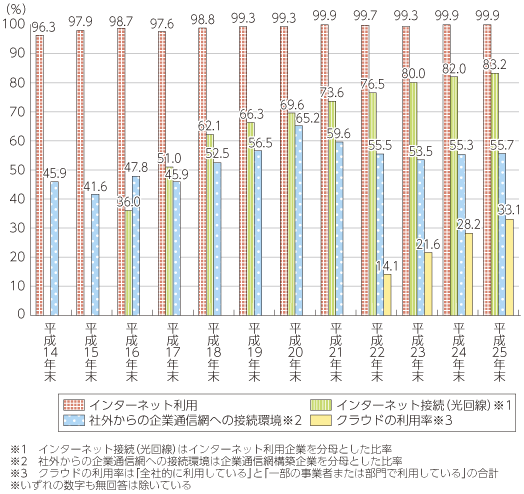Telework Offensive!
It's not just a welfare matter; moving toward a practical telework offensive
Author(s): Ena Ishikawa
Date: 16-Apr-2018
What is “Telework”?
Telework is what we call telecommuting in Japan. The Ministry of Internal Affairs and Communications in Japan defines it as follows:
Telework is a flexible working style using ICT (Information and Communication Technology), free from location or time constraints.
Reference: Efforts to promote telework in Japan
We usually use the words remote access, remote user, work from home, but those have the same meaning from the perspective of a flexible working style in the larger sense.
Telework Status Quo
How many office workers work at home once a week currently, in Japan?
As you can see in below link (available only in Japanese), the percentage of teleworkers who work at home more than once a week is 3.9% in the 2014 fiscal year, according to Ministry of land, Infrastructure and Transport. This is a decrease of 0.6 points or 400,000 people compare with the previous year.
(Reference: 雇用型在宅型テレワーカー数の割合)
The Japan government aims to increase teleworkers by 10% of total office workers by 2020, but this seems overly difficult to achieve.
Why is telework decreasing in spite of government contribution?
ICT is ever-progressing. It’s easy to implement new technology. As a matter of fact, more than half of companies have already implemented a system to allow mobile work from outside of the offices, so from this point of view we should say it is already somewhat common, especially for sales reps or IT engineers.

Special Report: Global Paradigm Shift Brought About by ICT -
Environment for Connection to Corporate Assets from Outside the WAN
- Y: Percentage, X: Years (Heisei 14 (2002) - 25 (2013))
- Red: Using Internet
- Blue: Can Connect to Corporate WAN from Outside
- Green: Using Fiber-based Internet Connection
- Yellow: Using Cloud Systems (fully or partial)
In short, it is not a technical problem that teleworker employment is not really catching on.
Telework success via paradigm shift
Allow me to share a personal experience: When I was pregnant 11 and 6 years ago, I took advantage of telework. We didn’t have a formal telework system at eSolia, but thanks to my understanding boss, I was able to work at home without interference to our business. In fact, I thought it was more efficient and productive for a company to allow work at home, especially in the case of suffering with terrible morning sickness or a big tummy for the 2-hour round-trip on a crowded train.
However, that is just an example of using telework during pregnancy or maternity leave, but there are other cases. For example, it is more efficient to work at home when you need to concentrate on creating reports or presentation documents in some cases. In order to get familiar with telework, it is indispensable for companies to gain more understand of its advantages.
It’s not just social welfare, or a “telework offensive” with productivity as a goal, but rather simply a matter of using the latest various ICT tools to provide the same working environment at home, as one has in the office.
The reason why telework hasn’t prevailed yet is there is still a preconception that telework isn’t productive, and it is only for social welfare. Telework will let your business be more productive, so, the secret of success is a paradigm shift.
Focusing on productivity, here are four advantages of telework:
- Retain superior human resources in various working styles
- Operational efficiency for speeding up business
- Cost reduction with shorter or no commutes
- Business continuity planning
If implemented with a sense of the above advantages, Telework can be rolled out, having a sense of purpose.
ICT Tool deployment and usage
There are various Telework styles, but it will be useful to have the below ICT tools.
Necessary Systems
- Internet
Useful Systems
- Cloud time-tracking system
- VPN and remote access
- Internal Instant message system
- Video conference or Video chat system
- Cloud Phone system
- Printer
First, you need to discuss how to implement Telework internally. Once your “Telework Offensive” becomes reality, it will result in increased productivity, improved employee satisfaction and retention of superior human resources.
And you should note that, there may be subsidies available (such as the ones from the Japan gov’t below) for small and medium-sized companies in order to proceed with Telework.
- Ministry of Health, Labor and Welfare:
- The Tokyo Metropolitan Government Bureau:
Ask eSolia
eSolia can help you to implement Telework, from consulting to installation and rollout of the ancillary systems involved.
- eSolia Cloud Database “PROdb”
- Efficient Business via IP Telephone, Cloud Phone Service
- Hire eSolia for Project, Procurement, Asset and Compliance Management
Please do not hesitate to Contact Us.